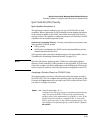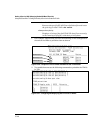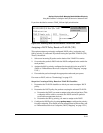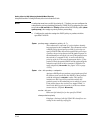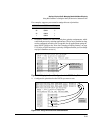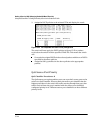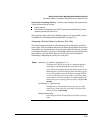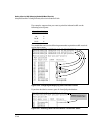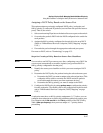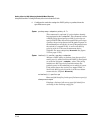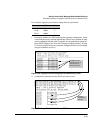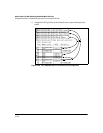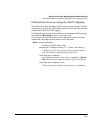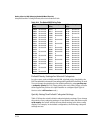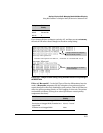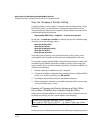
Quality of Service (QoS): Managing Bandwidth More Effectively
Using QoS Classifiers To Configure Quality of Service for Outbound Traffic
Assigning a DSCP Policy Based on the Source-Port
This option assigns a previously configured DSCP policy (codepoint and
802.1p priority) to outbound IP packets (received from the specified source-
ports). That is, the switch:
1. Selects an incoming IP packet on the basis of its source-port on the switch.
2. Overwrites the packet’s DSCP with the DSCP configured in the switch for
such packets.
3. Assigns the 802.1p priority configured in the switch for the new DSCP.
(Refer to “Differentiated Services Codepoint (DSCP) Mapping” on page
15-51.)
4. Forwards the packet through the appropriate outbound port queue.
For more on DSCP, refer to “Terminology” on page 15-5.
Steps for Creating a Policy Based on Source-Port Classifiers.
No t e You can select one DSCP per source-port. Also, configuring a new DSCP for
a source-port automatically overwrites (replaces) any previous DSCP or
802.1p priority configuration for that port.)
1. Identify the source-port classifier to which you want to assign a DSCP
policy.
2. Determine the DSCP policy for packets having the selected source-port:
a. Determine the DSCP you want to assign to the selected packets. (This
codepoint will be used to overwrite the DSCP carried in packets
received through the source-port from upstream devices.)
b. Determine the 802.1p priority you want to assign to the DSCP.
3. Configure the DSCP policy by using qos dscp-map to configure the priority
for each codepoint. (For details, refer to the example later in this section
and to
“Differentiated Services Codepoint (DSCP) Mapping” on page
15-51.)
No t e A codepoint must have an 802.1p priority assignment (0 - 7) before you can
configure that codepoint as a criteria for prioritizing packets by source-port.
If a codepoint shows No-override in the Priority column of the DSCP Policy
Table (show qos dscp-map), then you must assign a 0 - 7 priority before
proceeding.
15-47



